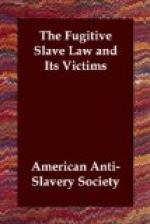Williamson held Wheeler back, and the woman went on
shore, a number of colored persons taking up the
boys and carrying them from the boat. They
were enabled to escape. (July 18, 1855.)
The celebrated case of PASSMORE WILLIAMSON followed, before Judge Kane, of the United States District Court. (See “Case of Passmore Williamson,” reported in full, and published in Philadelphia, by Uriah Hunt & Son, 1856.) On the 27th July, Mr. Williamson was committed to Moyamensing Prison, by Judge Kane, “for a contempt of the court in refusing to answer to the writ of habeas corpus;” Mr. W. having answered that he had not, and never had had, the custody of the three alleged slaves, and therefore could not produce them in court. Mr. Williamson was kept in prison until November 3d, when he was discharged by Judge Kane, the technical “contempt” having been removed.
CELESTE, a mulatto woman, claimed as a slave, before Judge Burgoyne, Cincinnati, Ohio. It appeared that she was brought to Cincinnati by her master, and she was set free.—Cincinnati Gazette, July 7, 1855.
Two fugitives, in Indiana, (September, 1855,) requested aid of the conductor of the Madison and Indianapolis Railroad. The aid given was to take them back to Madison, whence they were conveyed over the river to Kentucky. Before leaving that State they had been hunted and attacked by dogs. These they had despatched with their knives. The conductor was dismissed from his position. An agent of the express company was said to have aided him in the surrender of the men.—Madison Courier.
JACK, a colored boy, nine years of age, “claimed by Joseph Tucker, of Mobile, as his slave, was sent back to his master from Boston, in the brig Selma, Captain Rogers, on the 18th inst.” (October, 1855.)—Boston Times.
JACOB GREEN, a colored man, was seized near Hollidaysburg, Pennsylvania, by one Parsons, as a fugitive slave. Parsons could show no authority for detaining Green, who, with the help of some bystanders, released himself and escaped.—Hollidaysburg Standard, October 24, 1855.
Four men indicted for kidnapping at Greensburg, Indiana, in the Spring of 1855. Their names—David and Thomas Maple, Morrison, and McCloskey. Charged with kidnapping two men, whom they conveyed to a slave state, and sold as slaves. The two Maples, fearing the indictment, absconded. The other two were arrested, and brought to trial in October, 1855, at the State Court, before Judge Logan. “Defendants’ counsel moved to quash the indictment, for the reason that the section of the statute of Indiana against kidnapping was in violation of the acts of Congress, and, therefore, void; and the Court accordingly quashed the indictment”—Indianapolis Journal.
Eight fugitives from Kentucky reached Adams County, Ohio, closely followed




